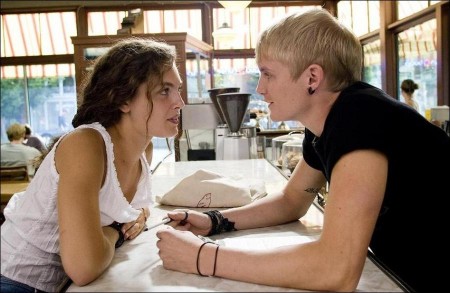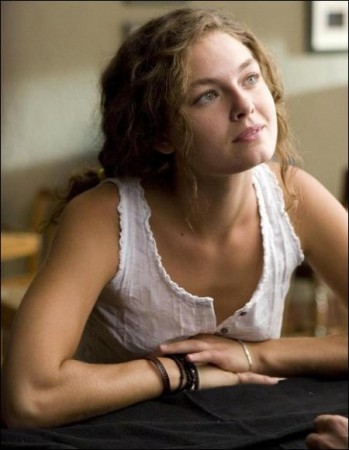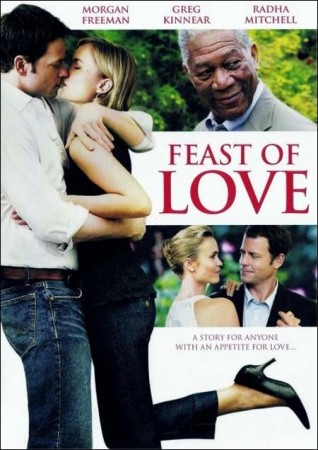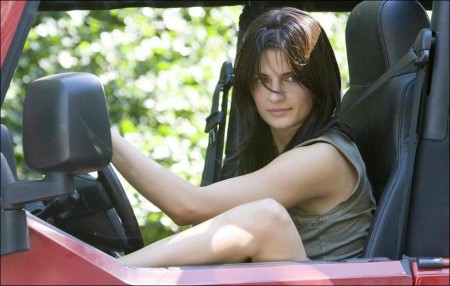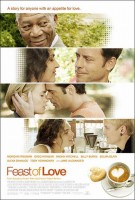Tagline: A story for everyone with an appetite for love.
In a coffee shop in a tight-knit Oregon community a local professor and writer Harry Stevenson (Morgan Freeman) witnesses love whipping up mischief among the town’s residents. Among young and old, among both parents and lovers, among the sweet and the savage, among humans and even animals, Harry watches in awe as love mystifies, wounds, devastates, inspires, makes unreasonable demands and profoundly shapes the lives of everyone around him – including himself.
From the die-hard romantic coffee shop owner Bradley (Greg Kinnear) who has a serial habit of looking for love in all the wrong places, including with his current wife Kathyrn (Selma Blair); to the edgy real estate agent Diana (Radha Mitchell) who is caught up in an affair with a married man (Billy Burke) with whom she shares an ineffable connection; to the beautiful young newcomer Chloe (Alexa Davalos) who defies fate in romancing the troubled Oscar (Toby Hemingway); to Harry himself, whose adoring wife (Jane Alexander) is looking to break through his wall of grief after the wrenching loss of a loved one… All of these strands intertwine into one epic love story in which no one can escape being bent, befuddled, delighted and ultimately redeemed by love’s inescapable spell.
Mischief, Mayhem and Mystery
Director Robert Benton, who celebrates love’s astonishing variety of forms in FEAST OF LOVE, is no stranger to chronicling the mischievous inner workings of the heart – though he has never done so in such a magical and unabashedly passionate story before. Benton began his Hollywood career by co-writing the classic 1960s bank robber romance “Bonnie and Clyde,” garnering the Academy Award in his feature film debut, and influencing countless edgier love stories to come.
He would go on to win another Oscar, a decade later, for directing the quintessential divorce drama/comedy “Kramer vs. Kramer” (for which he also received a Best Screenplay Adaptation nomination), which navigated the treacherous territory of what happens when love falls apart. He then won a third Academy Award for the original screenplay for the Depression-era, “Places In The Heart;” this time exploring the complexities of family love, which also garnered him an Oscar nomination for Best Director.
Given Benton’s career-long fascination with the different kinds and consequences of love, few directors could have seemed better suited to tackle Charles Baxter’s critically praised breakout novel about the wondrous totality of all of love’s forms. In his novel, the awardwinning Baxter unleashed a kind of “Midsummer Night’s Dream” on modern suburbia, following the intersecting paths of both true love and romantic folly that fuel and bind a community behind its closed doors.
The book was filled with young lovers finding safety in one another, unexpected lovers tumbling into one another’s arms, illicit lovers playing with danger, parents seeking solace for the love of lost children, lost children seeking out parental love, and most of all, the author’s search for just how it is that our troublesome, agonizing hearts also see us through life with so much grace and beauty. The result was a story that was not only funny and sensuous, but that gave readers a rich sense of the human interconnectedness that anchors us all.
In The New York Times, Jacqueline Carey wrote of the book: “Charles Baxter shows us the hard-won generosity of spirit that day-to-day dealings with other human beings require. He builds a community right on the page before us, using a glittering eye, a silvery tongue – and just a little moonlight.”
Among the book’s many great admirers were renowned producers Tom Rosenberg and Gary Lucchesi of Lakeshore Entertainment. Rosenberg and Lucchesi have long had a penchant for pairing remarkable literary works with great filmmakers, and in 2005 garnered the Academy Award for Best Picture with the acclaimed “Million Dollar Baby,” directed by Clint Eastwood, screenplay by Paul Haggis, based on a short story by F.X. Toole.
Rosenberg could not resist Baxter’s vast, unflinching way of tackling perhaps the most complex, enigmatic and vital of human subjects. “FEAST OF LOVE is about life,” he says. “In the novel, I think Charles Baxter basically suggests that love is life’s most meaningful experience and you have to seek it out and remain true to it, no matter what happens – and that became the powerful idea that drove the film.”
For Lucchesi, the core of the film was deeply personal right from the start. He says, “FEAST OF LOVE embraces the journey of life, and how life and love walk together. I’m 51 years old. I’ve been married 28 years. I don’t know how you get through life if you don’t have an emotional side being satisfied. I can tell you that a Saturday morning sitting in my kitchen having a cup of coffee with my wife really pleases my heart – and I think what’s so wonderful about FEAST OF LOVE: it celebrates those sort of unheralded emotional moments that keep us going.”
Lucchesi was also drawn to the profound universality of the story, traversing as it does through so many different kinds of entwinings – from friends to lovers to life-long spouses to family relationships. “It’s always quite fascinating to see how love and relationships evolve through the years and in this movie we have three different generations of relationships, and many different kinds of relationships as well, which makes the story so relatable no matter who you are,” he says.
Rosenberg and Lucchesi were so in love with FEAST OF LOVE that they knew the adaptation from page to screen would, by rights, become a careful, delicate process. They also realized right from the start it would not be an easy task. To begin with, Baxter’s story is filled with a wide array of characters, each of whom has his or her own stylistically distinctive story to tell.
Anchoring the modern fable is Harry Stevenson, the grieving philosophy professor whose keen perspective on the people around him doesn’t always extend to himself. Harry, in turn, watches as his younger friend Bradley Smith finds himself trapped in a wild roller-coaster of repeated blind bliss followed by rejection. When Bradley’s wife Kathryn leaves him for another woman, Bradley throws himself into a rebound relationship with Diana, a supposed “anti romantic” real estate agent who just can’t seem to stop her ongoing affair with David, a married man. Meanwhile, for Chloe and Oscar, the young couple who work as baristas in Bradley’s coffee shop, love is all about living in the fierce passion of the moment. But their hoped-for future is threatened by Oscar’s violent, abusive father, Bat, and overshadowed by a psychic’s dark prediction.
In Baxter’s novel, he uses himself as a character to weave all these people and their vignettes together into a tapestry bursting with color, insight and razor-sharp wit. But when screenwriter Allison Burnett came on board, he realized he had his hands full. He had to find a way to get to the literal heart of Baxter’s story – while telling the tale in a more streamlined and cinematic, rather than literary, way. Ultimately, he found the means to merge Baxter and Harry Stevenson into one person, a single narrator who ultimately interconnects all the characters trajectories into one as the witness of the many-stranded web they weave. “That was a very shrewd idea,” comments Lucchesi.
Burnett’s screenplay for FEAST OF LOVE also imbued the story telling with a fresh immediacy by reframing the tale entirely in the present tense. Rosenberg explains, “The book was told primarily in flashback but we wanted the story to unfold more dynamically.”
Perhaps the most dramatic change came when the decision was made to add in the tragic death of Harry and Esther’s son, Aaron, who in the book was still alive, though struggling with drug addiction. Says Lucchesi, “That made a really strong change in the screenplay, adding the undercurrent of loss to the theme of love.”
As the script developed into a complex, multihued story, Rosenberg and Lucchesi began to consider what kind of director could bring all the strands of FEAST OF LOVE together, and with a fearless willingness to let the tale be all at once as anguished, as funny and as tender as love itself can be at different times. They both felt Robert Benton, whom they had previously worked with on the screen version of Philip Roth’s novel “The Human Stain,” starring Anthony Hopkins and Nicole Kidman, was the perfect match.
Explains Lucchesi: “Number one, Benton knew and loved the book. We also knew he always creates a world where actors can be very comfortable, which was so important to this film. He’s very creatively generous that way. Tom and I had been actually looking for a project for Benton, so when the screenplay for FEAST OF LOVE was ready we gave it him. He said yes immediately.”
For the producers, choosing Robert Benton to helm the film was also right in line with the personal nature of the project. Rosenberg says, “We have developed not just a respect but a deep friendship with Benton. He’s fantastic with actors, he’s great to work with, he’s very collaborative and we knew we would have an enjoyable experience.”
Robert Benton, it turns out, had already been flat-out seduced by Baxter’s novel. “I read the book when it first came out and I fell in love with it then,” the director notes. “I tried to get the rights to it even then and wasn’t able to, and it haunted me for four years. Finally, fortunately, because of Tom Rosenberg and Gary Lucchesi, it came back to me. I felt extremely lucky to have the chance to do it.”
Benton’s attraction to the novel lay in the vastness of its scope, covering every element of love’s beauty, humor and tragedy, which in turn drove his cinematic approach. “The reason I loved the book is that its entire landscape is not just love but the enormous number of varieties of love that exist – some positive, some negative – from parental love, to love that blasts you loose, to love that’s tragic, to love in the middle of unfolding. Charles Baxter wrote a sublime novel, but it also seemed to me that it’s a cinematic novel, and that’s rare,” he summarizes. “Love in all its complexity and endlessly revivifying nature is, to me, always an extraordinary subject matter for a film.”
The Many Faces of Love
The filmmakers now turned to the next crucial step: creating FEAST OF LOVE’s ensemble cast of friends, lovers, family and neighbors. For Robert Benton, nothing could have been more key to the film’s creation. “I’m not necessarily a very good director,” he says with characteristic modesty, “but I’m really great at casting, and I’m really great at trusting the actors I cast.”
Gary Lucchesi adds: “I think for a director like Benton, casting is everything because once he gets to the set, he makes very subtle adjustments in performance. He doesn’t try to put a very strong hand on the actor and alter their performance drastically; he would rather hire the right actor to begin with. That’s much more who Benton is.”
The casting began with the very core of the story: Harry Stevenson, the town philosopher who doles out advice to all of the lovelorn and newly in love, while his own heart is aching. As they considered the roster of venerable actors who could play the role, one stood out early on.
Recalls Tom Rosenberg: “Once Harry was there on the page, it was Gary Lucchesi who said, ‘‘This is Morgan Freeman, this is who should play this role.’ And he was exactly right. Morgan is such a great actor that he was able to keep in mind, as Harry must, not just his role but everybody’s role in the film, and, along the way, he helped all the actors tremendously through his experience and generosity.”
Benton says of Freeman, “He’s astounding. He knows what can and cannot be acted, he knows how to be still and he knows how to listen, which are all the most invaluable parts of being an actor. You cannot act moral fiber, or a kind of stature – you either have it or you don’t. I don’t mean even as an actor, I mean as a human being, and he truly has that quality. That’s what makes him a brilliant choice for this role.”
When Morgan Freeman read the screenplay, he felt an immediate affinity with Harry and his role as the man who watches the constant ebb, flow and crash of love all around him. “I do often seem to be drawn to witness characters,” Freeman ponders. “I guess they sort of have the last say, as it were. But this is also quite different from any other film role I’ve done. The whole thing is about love, and as Harry, I’m right in the middle of it all, so it’s a complete departure on that level.”
Harry may be a pillar of the community, but his rock is his wife, Esther, with whom he is still deeply enamored. To play the role, Robert Benton saw an opportunity to work with one of his favorite actresses, Jane Alexander, whom he also directed in “Kramer Vs. Kramer.” She and Freeman had been seen together in two films previously, “Brubaker” and “Glory,” but never had scenes with one another until FEAST OF LOVE.
“I’ve always looked for a chance to work with Jane again,” says Benton. “She’s phenomenal. One of my favorite scenes in the film is between Morgan and Jane. It’s a scene about tenderness and love, and she is so amazing in that scene. She was absolutely there in the best sense of the word.”
For Alexander, the attraction lay in working with Benton again. “Anything he would ask me to do, I would jump at doing,” the actress says. “He was a wonderful writer on ‘Kramer Vs. Kramer,’ but he also showed that he had great subtlety with regard to acting, and now that’s only increased with these 28 years. He’s just really extraordinary. He’s very, very close to the actors when you’re working on the set. It’s just so great to have Benton right there, seeing and hearing every little nuance.”
Morgan Freeman was equally excited to finally have a chance to interact with Alexander on screen, especially in such intimate moments revealing the inner workings of something not often depicted on screen: a long, loving marriage. “She gives such perfect performances, that I said, ‘Oh my god, I finally get a chance, here she is!’” says Freeman.
The yang to Harry Stevenson’s yin is Bradley, the hopeless romantic who is also hopelessly inept at relationships. To capture both the humor and the humanity of Bradley, the filmmakers turned to none other than Greg Kinnear who began his career as a comedian but has grown into one of today’s most sought-after screen stars, with stand-out roles ranging from “As Good As It Gets” to “The Matador” to his recent turn as the outrageously optimistic patriarch of a profoundly dysfunctional family in the runaway indie hit “Little Miss Sunshine.”
“Greg’s perfect for Bradley, and we were very fortunate that he wanted to play the role,” says Rosenberg. Adds Benton: “Bradley is an extremely difficult character, and one of the things that Greg can do so well is simultaneously make you feel sympathy for a character and allow you to laugh at the same time. To combine both qualities is extremely rare. He’s such an amazing actor, I cannot tell you how much I have loved working with him.”
Kinnear says he was drawn immediately to “the unexpectedness of the script.” He also found himself won over by Bradley’s invincible belief in romance. “The thing that I most value in Bradley Smith is just his unabashed hopeful spirit about love and about surviving,” says Kinnear. “He always tries to find inspiration in spite of everything collapsing around him.”
Starring as the two women who create havoc in Bradley’s life — Bradley’s about-to-beliberated wife, Kathryn, and Diana, the very different woman with whom he rebounds following the abrupt end of his first marriage – are two of today’s most popular and beautiful actresses: Selma Blair and Radha Mitchell.
Blair’s role is brief yet pivotal – but it was the overall story of FEAST OF LOVE that she couldn’t resist. “This was the most beautiful script I’ve ever read,” Blair comments. “And then with Robert Benton directing it, saying yes was just a given. I would have done anything to get to say a line in this movie, to get to watch this cast of people working together.”
As for the role of Kathryn, Blair notes that Kathryn leaves an indelible mark on Bradley that reverberates throughout his story. “Kathryn really does set up Bradley’s inability to listen and pay attention,” she observes. “Just when he thinks everything is going great, she lets him know that things are actually very different from what he sees.”
To play Kathryn’s antithesis, Diana, the icy beauty who sees love in purely pragmatic terms and claims not to believe in romance, the filmmakers chose Radha Mitchell, the Australian actress who has risen to the fore with roles in Woody Allen’s “Melinda and Melinda,” Marc Forster’s “Finding Neverland,” Tony Scott’s “Man on Fire” and the unusual love story “Mozart and the Whale.”
“Radha is a really fine actress whom we’ve been wanting to work with for quite some time. We suggested her to Benton and he got the DVD’s of the movies he hadn’t seen of hers, especially ‘Man on Fire’ and that just floored him,” recalls Rosenberg. “She was simply perfect for Diana — attractive, strong and very intelligent. She’s got a bit of that kind of Grace Kelly coolness to her.”
Meanwhile, the filmmakers began a major casting search to find a fresh face for the role of Chloe, who Rosenberg describes as no less than “the life force of the movie,” and who Benton says is “the most extraordinary character because she is life itself. She is enormously appealing because she is so pure and she faces both the force of tragedy and love head on.”
The filmmakers couldn’t have been more gratified with their choice of Alexa Davalos, a rising star of Greek descent who made her feature film debut in “The Chronicles of Riddick.”
Rosenberg says, “We saw a lot of people for the role because we knew from the start we were looking for an unknown or slightly known actress, but when Alexa read for us, we knew there was something very special there.”
Robert Benton was especially impressed with what Davalos brought to the role. “I’ve not seen talent like her in a long, long time,” he comments. “An enormous part of her work is with Morgan Freeman, and there’s really no bigger heavyweight than Morgan. And by God, she holds her own with him, I mean, they work together beautifully. This girl is just really astounding. They don’t get better than Alexa.”
For her part, Davalos quickly fell in love with Chloe. “She’s such a free spirit, which is what’s so beautiful about her. Chloe’s got this very knowing sense about her, and she has a way of finding the joy in everything,” she observes.
The opportunity to portray two very different kinds of love through one character was also a strong attraction for Davalos. “The love story between Chloe and Harry, which is the father-daughter sort of love story, is so rare and beautiful to see. To Chloe, Harry’s this beautiful man full of wisdom but also very aware of reality – he’s that person you can go to no matter what. She falls in love with him in a fatherly sense. And then obviously there’s also the love story between Oscar and Chloe, which is that first blush of completely reckless, abandoned love,” she says. “I feel really lucky to have had a chance to explore both through Chloe’s eyes.”
To play Chloe’s great love Oscar, it was Tom Rosenberg who recommended auditioning another rising young star, Toby Hemingway, who had just wrapped another Lakeshore film, “The Covenant.” Rosenberg says, “I had a feeling about him, but I didn’t want him to come in as my person, so I told him he had to win it. And he did. He just was great.”
Hemingway knew the role would be a fantastic challenge, but he was up for it. “Oscar is a bit of a lost soul,” he notes. “His mom left in about 8th grade, and his dad, played by Fred Ward, is an alcoholic and abuser who drove his mother away. Oscar’s already been in rehab, and I think he can’t really see anything bright to his future until Chloe comes in and then it’s truly like he’s reborn. What happens between them is one of those rare, perfect things, sort of like they’re made for each other.”
Rounding out the stellar cast of FEAST OF LOVE are Stana Katic as Jenny, the shortstop with whom Kathryn falls unexpectedly in love, and Billy Burke as David, the married man with whom Diana carries on a torrid affair, and who becomes an unlikely moral fulcrum in the story.
Sums up Morgan Freeman of the bond that was created between the entire cast: “When you get a great ensemble like this, and put that together with a really good script, the work becomes sort of a regenerative thing. It feeds itself. It gets easier and easier and more and more fun to do.”
The Landscape of Love
With their singular ensemble cast chosen, Benton, Rosenberg and Lucchesi, as well as producer Richard S. Wright and executive producer David Scott Rubin, now began the search for a shooting location, in which to unfold this reverie of longing, loss and life-affirming encounters with love. Although Charles Baxter’s book was set in Ann Arbor, Michigan, the filmmakers went off in search of a dynamic, smaller city with a neighborhood feel that would allow them to shoot on a budget within the U.S. When Tom Rosenberg read an article about the beauty and distinctive feel of Portland, Oregon, he had a feeling the up-and-coming Pacific Northwest city might be perfect.
“I talked to Richard Wright, and said ‘Find out what’s it like to shoot in Portland’ and he came back and said it is competitive. Then I took a trip there and really fell in love with the city,” recalls Rosenberg. “It’s a terrific place, surprising in lots of ways, very sophisticated, with very sensible, nice people.”
Adds Gary Lucchesi: “It is one of the most beautiful cities in America. Even though Portland has 800,000 people and has all the art and culture of a big city, as well as great restaurants and terrific coffee, it still has a quieter, calmer feeling. Our entire Los Angeles crew fell in love with Portland, too, and we now plan on doing more movies there.”
The production started in one of Portland’s hidden neighborhoods, the so-called Mississippi District surrounding Mississippi Ave. on the East side of the Willamette River, which is lined with local shops and plenty of foot traffic. Here, the popular Fresh Pot coffee house was transformed into Bradley’s “Jitters Coffee Shop,” for 2 weeks of filming. Later, the lush, green Mt. Tabor area in Southeast Portland with its beautiful older homes became the location for Harry’s and Bradley’s side-by-side residences; while world-renowned Reed College, set in a Portland residential neighborhood, served as Harry’s university, where he takes his late night strolls, as well as the location for the film’s football and baseball games.
Everyone on the film crew was impressed by the graciousness and enthusiasm of the Portland locals, while the locals in turn were amused to see the film crew actually resort to making rain in a city that usually provides more than its share of wet, cloudy days. Much as Portland provided a lovely atmosphere for the film, it was Robert Benton’s set that really made the entire cast and crew feel at home. “It’s like he’s throwing a cocktail party for the cast and crew in a way,” describes Greg Kinnear of the atmosphere.
Adds Alexa Davalos: “Robert Benton gives you all the freedom in the world to play and experiment and see what works. He’s incredibly supportive. And he has such vision that you just trust your instincts. I love him to death.”
In working with his crew — including cinematographer Kramer Morgenthau, who blends a touch of the dream-like into his otherwise realistic portrait of Portland’s neighborhood ambience, and production designer Missy Stewart, who carefully created the nuances of the many different houses and bedrooms in which the strands of the story unfold – Benton always emphasized bringing the universal nature of love to the fore.
Summarizes Benton: “My hope was always that this would be a picture that audiences young or old, whether they’re in New York or Los Angeles, Kansas City or Des Moines, all find enriching. I want them to feel some of what I felt when I read Charles Baxter’s novel, about what love is and what it isn’t, and what life is and what it isn’t. I always saw FEAST OF LOVE as referring to this life that’s set out for us with this enormous, complicated rich variety of love.”
Production notes provided by Metro Goldwyn Mayer.
Feast of Love
Starring: Morgan Freeman, Greg Kinnear, Radha Mitchell, Jane Alexander, Alexa Davalos, Toby Hemingway, Selma Blair, Stana Katic, Billy Burke, Erika Marozsan
Directed by: Robert Benton
Screenplay by: Allison Burnett
Release: September 28, 2007
MPAA Rating: R for strong sexual content, nudity and language.
Studio: Metro Goldwyn Mayer
Box Office Totals
Domestic: $3,511,074 (61.2%)
Foreign: $2,230,146 (38.8%)
Total: $5,741,220 (Worldwide)
